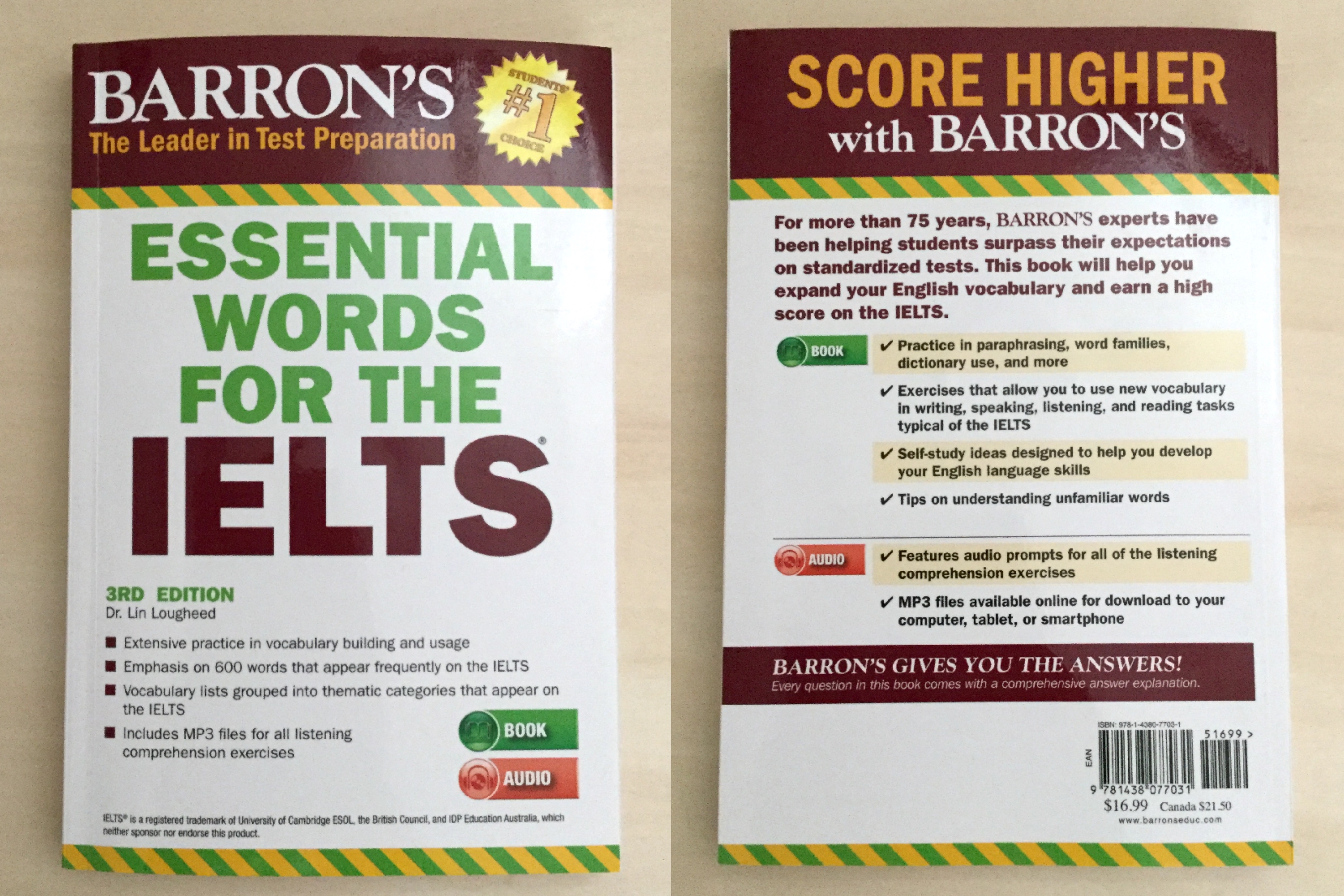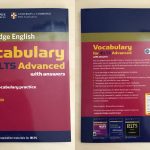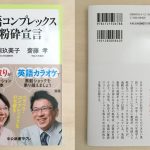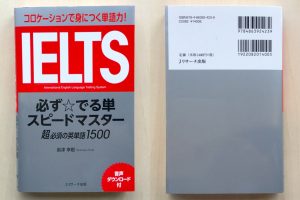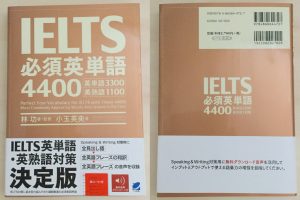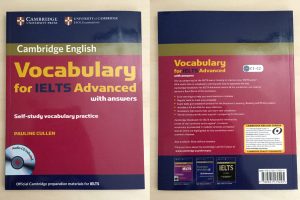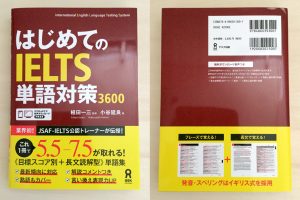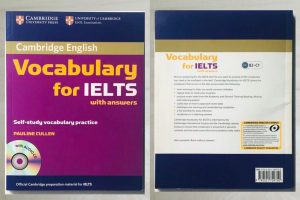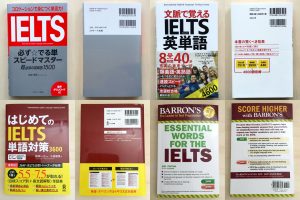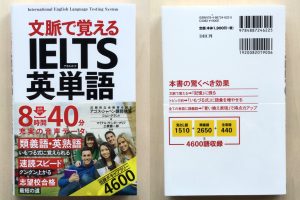BARRON’Sからの英単語帳
こちらのIELTSの必須単語は、リーディングとリスニングで必要となる英単語、またライティングとスピーキングでこれは使えるという600の単語が載っています。 また、新しい単語の意味を理解するためにさまざまな手がかりを使用する方法を学べるのも特徴の一つです。
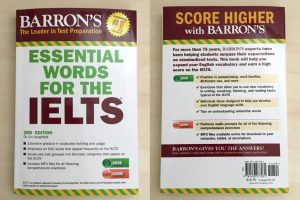
CONTENTS
Introduction
Vocabulary and the IELTS IELTS
Study Contract
Self-Study Activities
How to Use This Book
Unit 1: The Natural World
Environmental Impacts of Logging
Bird Migration
Plant Life in the Taklimakan Desert
Unit 2: Leisure Time
Peripheral Vision in Sports
History of the Circus
Uses of Leisure Time
Unit 3: Transportation
First Headlamps
Major Subways of Europe
Electric Cars Around the Globe
Unit 4: Culture
Origins of Writin
g Hula Dancing in Hawaiian
Culture The Art of Mime
Unit 5: Health
Nurse Migration
Aerobic Exercise and Brain Health
How Drugs Are Studied
Unit 6: Tourism
Hiking the Inca Trail
What is Ecotourism?
Learning Vacations
Unit 7: Business
What Makes a Small Business Successful?
Brand Loyalty
Global Outsourcing
Unit 8: Society
Social Networking
Why Are Women Leaving Science Careers?
Wheelchair-Accessibility Issues
Unit 9: Education
Learning Styles
The Homeschool Option
Educating the Gifted
Unit 10: Technology/Inventions
The Development of the Lightbulb
The Invention of Variable-Pitch Propellers
The Transatlantic Cable
Appendix
Word List
Answer Key
Audioscripts
Introduction
Barron’s Essential Words for the IELTS will help familiarize you with the vocabulary you will find in the reading and listening sections of the IELTS exam (International English Language Testing System). As the number of words you understand when you are reading and listening increases, your speaking and writing vocabulary will improve as well.
VOCABULARY AND THE IELTS
Vocabulary is not tested directly on the IELTS. There are no questions on the IELTS that ask specifically for the meaning of a word. However, comprehension is tested. Can you understand what you read? Can you understand what you hear? The more words you know, the more you will understand. The more words you know, the more fluently you will be able to speak and write.
Essential Words for the IELTS will teach you 600 words that you might find on the exam in reading and listening and that you might use in writing and speaking. You will also learn how to use various clues for understanding the meaning of new words.
• Context clues. The context provides clues about the meaning of a word. The topic of the passage or paragraph can help you understand a new word, and there may also be an explicit definition, synonym, or paraphrase in the text. You will practice using the context
to understand new vocabulary.
• Synonyms and paraphrases. One idea can be expressed in different ways. You will reinforce the vocabulary you are learning by dentifying words and phrases with similar meanings.
• Compound words, prefixes, and suffixes. These can help you analyze a word to determine the meaning. You will learn to recognize common prefixes and suffixes and understand how words are joined together to form new words.
• Word families. These are the different parts of speech noun, verb, adjective, and adverb-that share a similar meaning. The book presents word family charts to help you learn the most common forms.
• Dictionary. If none of the above have helped you understand the meaning of a word, you can use a dictionary designed for learners of English. You can use an online dictionary to help you learn the correct pronunciation of new words. In Essential Words for the IELTS, you will practice one very effective vocabulary strategy that will improve your comprehension. This effective strategy is to use a word four ways: Read the word, write the word, ten to the word, and speak the word. Every activity in each chapter will help you develop this strategy. Panotebook of new words you are learning. Each vocabulary list.
consists of twenty words selected from the accompanying mon ing passage. You will probably find additional words in each reading pas. sage that are new to you. You can keep your own lists of these words and other words you come across. You can apply the same skills and strategies to learning these words as you do to the vocabulary word lists in the book.
When you learn a new word, you should practice the same strategy. If you hear a new word, write the new word in a sentence. Read the sentence to yourself. Say the sentence aloud. Every chance you get, review the words you are learning. Say them, write them, read them, and listen to them.
IELTS STUDY CONTRACT
You must make a commitment to study English. Sign a contract with yourself. You should never break a contract—especially a contract with yourself.
• Print your name below on line 1.
• Write the time you will spend each week studying English on lines 4-8. Think about how much time you have to study every day and every week, and make your schedule realistic.
• Sign your name and date the contract on the last line.
• At the end of each week, add up your hours. Did you meet the
requirements of your contract?
MY IELTS STUDY CONTRACT
, promise to study for the IELTS. I will begin my study with Barron’s Essential Words for the IELTS, and I will also study English on my own. I understand that to improve my English I need to spend time on English. I promise to study English hours a week. I promise to learn new words every day, I will spend hours a week listening to English. I will spend_ hours a week writing English. I will spend hours a week speaking English. I will spend_ hours a week reading English. This is a contract with myself. I promise to fulfill the terms of this contract.
SELF-STUDY ACTIVITIES
Here are some ways you can improve your English vocabulary on your own. Check the ones you plan to try. Add some of your own ideas.
Internet-Based Self-Study Activities:
LISTENING
Podcasts on the Internet
News websites: CNN, BBC, NBC, ABC, CBS
Movies in English
YouTube
Ted.com
SPEAKING
Use Skype to talk to English speakers (http://www.skype.com)
WRITING
Write e-mails to website contacts
Write a blog
Leave comments on blogs
Post messages in a chat room
Use Facebook and MySpace
READING
Read news and magazine articles online
Do web research on topics that interest you
Follow blogs that interest you
*Also subscribe to Simone Braverman’s excellent blog IELTS-blog.com with its many tips for IELTS preparation.
Other Self-Study Activities
LISTENING
Listen to CNN and BBC on the radio
Watch movies and TV in English
Listen to music in English
SPEAKING
Describe what you see and be what you see and do out loud
Practice speaking with a conversation
Sing or recite song lyrics
WRITING
Write a daily journal
Write a letter to an English speaker
Make lists of the things you see every day
Write descriptions of your family and friends
READING
Read newspapers and magazines in English Read books in English Read song lyrics
Suggestions for Self-Study Activities
Whether you read an article in a newspaper or on a website, you can use that article in a variety of ways to improve your vocabulary while you practice reading, writing, speaking, and listening in English.
・Read about it.
・Paraphrase and write about it.
・Give a talk or presentation about it.
・Record or make a video of your presentation.
・Listen to or watch what you recorded.
・Write down your presentation.
・Correct your mistakes.
・Do the same again.
PLAN A TRIP
・Go to www.cntraveler.com
・Choose a city, choose a hotel, go to that hotel’s website and choose a room, and then choose some sites to visit(reading).
・Write a report about the city. Tell why you want to go there. Describe the hotel and the room you will reserve. Tell what sites you plan visit and when. Where will you eat? How will you get around? write a letter to someone recommending this place (writing).
・Pick one event and read the articles about it (reading).
・Listen to an English-language news report on the radio or wat news program on TV about the same event (listening). Take or watch a as you listen.
・Write a summary of what you read and heard. Then write a show essay about the event (writing).
・Pretend you are a news reporter. Use the information from notes to report the news (speaking). Record the presentation. The watch the video and write down what you said (listening). Correct any mistakes you made and record the presentation again. Then choose another event and do this again.
EXPRESS AN OPINION
・Read a letter to the editor in the newspaper (reading). You can read sample letters to the editor at www.publishaletter.com.
・Write a letter in response in which you say whether or not you agree with the opinion expressed in the first letter. Explain why (writing).
・Pretend you have to give a talk explaining your opinion (speaking). Record yourself giving the talk. Then watch the video and write down what you said (listening). Correct any mistakes you made and record the presentation again. Then read another letter to the editor and do this again.
REVIEW A BOOK OR MOVIE
・Read a book (reading). Think about your opinion of the book. What did you like about it? What didn’t you like about it? Who would you recommend it to and why?
・Pretend you are a book reviewer for a newspaper. Write a review of the book with your opinion and recommendations (writing). You can find examples of book reviews at www.powells.com/review.
• Give an oral presentation about the book. Explain what the book is about and what your opinion is (speaking). Record yourself giving the presentation. Then watch the video and write down what you said (listening). Correct any mistakes you made and record the presentation again. Then read another book and do this again. You can do this same activity after watching a movie (listening). You can find links to movie reviews to use as models at www.mrde.com
SUMMARIZE A TV SHOW
・Watch a TV show in English (listening). Take notes as you listen.
・After watching, write a summary of the show (writing).
・Use your notes to give an oral summary of the show. Explain characters, setting, and plot (speakinal. Record yourself spear Then watch the video and write down what you said illa cord yourself speaking. what you said (listening).

